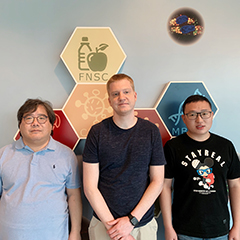A research team from the School of Life Sciences at The Chinese University of Hong Kong (CUHK) has developed a novel method for extracting enzymes from bacteria, which lowers the production cost yet improves the enzyme’s stability. It also opens up a new avenue for the enzymatic production of biodiesel, an eco-friendly and effective substitute for fossil fuels. The research findings were recently published in the Journal of the American Chemical Society.
Enzymes are small microscopic engines that drive the various chemical processes needed for life. Chemists often generate tailor-made enzymes and use them to produce drugs and other useful chemicals that we use daily. One example is the enzymatic synthesis of biodiesel.
Biodiesel is an emerging renewable fuel commonly used in blends with petroleum diesel, which produces less pollutants than traditional pure diesel. It is typically produced from vegetable oil or animal fats and methanol in the presence of a base catalyst. Enzymes can also act as a catalyst to produce biodiesel. In fact, enzymes generate less waste and require lower temperatures than traditional base catalysts, and they can even convert waste sources such as used cooking oil directly into biodiesel, while base catalysis requires rigorous pretreatment resulting in water pollution. Unfortunately, in their current state, enzymes are too expensive to compete with base catalysts. This is because enzymes require tedious purification procedures and subsequent immobilization to be easily recycled and reused.



























